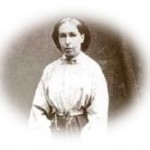Dear A.,—The “Daniel Webster” is filling, to sail to-night. This letter shall go in her. What a day and night we have had! What a whirlwind of work, sad work, we have been in! Immediately after closing my letter of yesterday, Mrs. Griffin and I were whisked away in a little boat, at the peril of our lives, and hustled, tumbled, hoisted, first into the “State of Maine,” where we lost our way amid frightful scenes, until we finally reached the “Elm City,” where we were going as night-watch to relieve the ladies belonging to her, who had been up all the night before. She had four hundred and seventy wounded men on board. We passed the night up to our elbows in beef-tea, milk-punch, lemonade, panada, etc. The men were comfortable. The surgeons let them, for the most part, have a night’s rest before their wounds were opened. Not so, however, on the “State of Maine,” where operations were going on all night; the hideous sounds filling our ears even in the midst of our own press of work.
Our men were so touchingly grateful. There was a poor fellow lying close to the door of the pantry where we were making and dispensing the food and drinks: his leg was amputated. I noticed, after a time, that he was stretching and straining to get at a bundle or something in his berth. I went to him as soon as I could. He turned his face to me, covered with tears, and put a little crumpled roll of pink paper into my hand, saying: “I heard you tell that man you gave him the last pin out of your dress: don’t give us everything; please take these,” — precious little roll! will I ever part with it! Such things are better for us than all the quinine in the country. We stayed chiefly in our pantry, giving out to the dressers and nurses all that was wanted; also to a detail who came from time to time from the “State of Maine.”
Oh, when shall I forget the sunrise that morning as it looked in through the little window beside me! When can I cease to remember the feelings with which I saw it!
Mr. Olmsted sent peremptory orders at nine o’clock that we should return home; and we left the “Elm City,” sure that the men had everything needful, and were safe in the faithful hands of Mrs. Balestier and Miss Charlotte Bradford. We were no sooner washed and dressed than the “Small ” scudded up to the landing to take on forty wounded just arriving by the railroad. The forty proved, as usual, to be eighty,— ghastly objects: this was like being on a battle-field. The men were just as they fell, in their muddy clothing, saturated with blood and filth. From then until now, when we have just put them on the “Webster,” Mrs. Griffin and I have been with them. One died in her care, and one in mine; there were some too far gone to know anything more in this world, but there were others, almost as badly hurt, who were cheerful, bright, and even talkative, — so different from the dreary sadness and listlessness of sick men. They seldom groan, except when their wounds are being dressed, and then their cries are agonizing: “Oh, doctor, doctor!” in such heartrending tones.
General Devens, wounded in the knee, Colonel Briggs, Tenth Massachusetts, wounded in the thigh, and several other wounded officers, were among the eighty; but they had their staff-officers or orderlies, and though we saw that they had what was necessary, we stayed ourselves with the men. We have just put part of them on the “Webster,” which sails for Boston this evening, and the rest on the “Elm City,” which sails for Annapolis at the same time. The “Spaulding” has just come up the river, and the quartermaster hails me that there are cases on board for me. Thank you all! Dr. Grymes has invited us to dinner on the “Webster,” that we may swallow necessary food, which we could not do on the polluted decks of the “Small.”
The trouble the medical authorities give Mr. Olmsted is terrible. They send the most conflicting orders, and there is no United States medical officer here, at this most important point, to refer to. Captain Sawtelle, Assistant Quartermaster, is so good to us. He and Colonel Ingalls and General Van Vliet are constantly shielding the Commission from annoyance. How nobly the Commission has done its work, how thoroughly, how wisely; with what lavish disregard of labor and care and fatigue, so long as the best possible is done for the service! Day and night, without sleep, sometimes without food, Mr. Olmsted and Mr. Knapp are working their brains and their physical strength to the utmost. Good-by! we are just going on board the “Webster.” No, we have only run alongside to give her the order to sail. So good-by to our dinner! I hoped to have sent this letter by her. The victory is a victory; but oh, the lives and the suffering it has cost!



